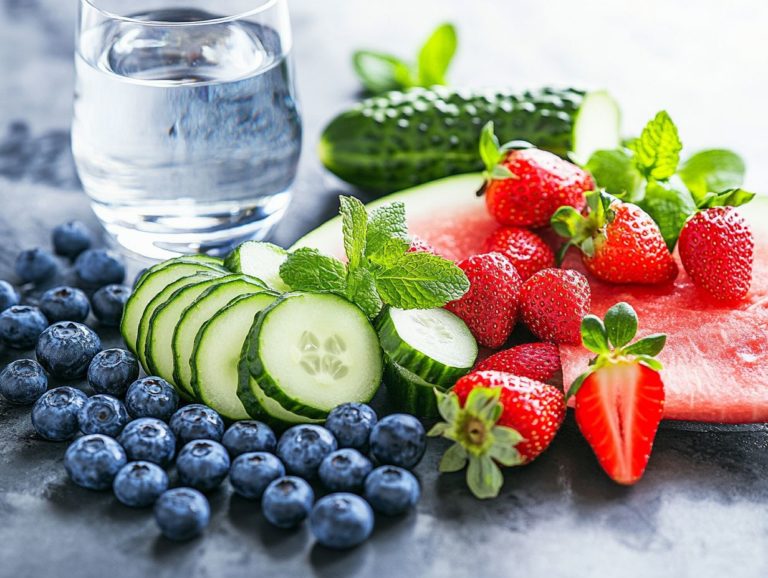What Is the Importance of Hydration?
Hydration is fundamental to your overall health and well-being, yet it often slips under the radar. Water is essential for many bodily functions, from regulating your temperature to aiding digestion.
This article delves into the benefits of staying hydrated. It explores the consequences of dehydration both immediate and long-term and highlights how hydration directly influences your physical performance.
You ll find practical tips for maintaining optimal hydration levels, along with insights into the relationship between hydration and your overall health.
Embark on this journey to discover why proper hydration is indispensable for everyone!
Contents
Key Takeaways:

Proper hydration is essential for the body to function properly, as water plays a vital role in various bodily functions. Dehydration can have both short-term and long-term consequences, such as fatigue, dizziness, and kidney damage. Maintaining proper hydration levels is crucial for physical performance and can significantly impact athletic capability.
The Role of Hydration in the Body
Hydration is essential for your body. It influences everything from cognitive function to joint lubrication and temperature regulation.
Experts like Walter Willett from Harvard T.H. Chan School of Public Health emphasize that adequate fluid intake is key to maintaining optimal health. This helps prevent dehydration, which can lead to a range of health issues.
By drinking water, you not only replenish lost fluids but also support the efficient functioning of your kidneys, helping remove waste from your body and balancing vital nutrients like sodium and potassium.
Understanding hydration is vital for everyone! This is especially true for older adults with unique hydration needs.
Functions of Water in the Body

Water plays a vital role in your body, performing essential functions such as maintaining cognitive clarity, lubricating your joints, and regulating body temperature.
It s a key player in nutrient absorption and waste elimination, ensuring every cell receives the essential minerals and vitamins necessary for optimal performance.
For instance, staying adequately hydrated can help you avoid the painful experience of kidney stones, which can form when urine becomes concentrated due to insufficient water intake. Dehydration can also lead to fatigue, headaches, and diminished cognitive function, underscoring the importance of consistently replenishing your fluids.
By understanding the myriad roles water plays, you can truly appreciate the significance of staying properly hydrated in your daily life.
Effects of Dehydration
Dehydration can profoundly impact your health in both the short and long term.
Mild symptoms may include fatigue and dizziness, but serious complications like kidney stones can develop.
Short-term and Long-term Consequences

The effects of dehydration can be quite alarming, appearing both in the short term think dizziness and fatigue and the long term, where it can lead to serious health complications like kidney stones.
In the immediate phase, your body struggles to maintain its optimal functions, often signaling distress with signs such as a dry mouth, relentless thirst, and difficulty concentrating.
As dehydration worsens, you may find yourself facing a rapid heartbeat and confusion, both of which can significantly disrupt your daily activities.
Over time, chronic dehydration can worsen conditions like urinary tract infections and may even result in kidney damage, given that the kidneys are particularly sensitive to inadequate hydration. Recognizing these symptoms is vital; ignoring them could lead to more severe health risks and complications that are easily avoidable with proper attention.
The Importance of Hydration for Physical Performance
Staying hydrated is crucial for your physical performance. Adequate hydration directly impacts your endurance, strength, and overall athletic capability, making it essential for anyone involved in physical activities or sports.
Impact on Athletic Performance

The impact of hydration on your athletic performance is truly profound. Even the slightest dip in fluid levels can lead to significant declines in your capabilities.
When you experience dehydration, it s not just your body that suffers; your ability to think clearly and make decisions can take a hit as well. Studies reveal that a mere 2% drop in body weight from fluid loss can impair your concentration and decision-making skills, which are vital in competitive sports.
You might find yourself battling increased fatigue, diminished endurance, and a heightened risk of injury. Stay on top of your game by hydrating effectively!
Regularly sipping on water and incorporating sports drinks that help you perform better into your routine can help you maintain optimal fluid balance.
Maintaining Proper Hydration Levels
Maintaining optimal hydration levels is crucial for your overall health. It s important for you to recognize your unique hydration needs and adjust your daily water intake accordingly to ensure you re at your best.
Tips for Staying Hydrated
To stay hydrated, you can embrace several straightforward strategies. Consider carrying a reusable water bottle.
Eat foods rich in potassium and sodium. Set reminders to ensure you re consistently sipping throughout the day.
Make hydration a fun part of your routine! Try different flavored waters to keep things interesting.
Incorporating these habits into your daily routine can significantly elevate your well-being. Check out hydration apps to easily track your water intake!
Don’t shy away from alternatives like herbal teas or fruit-infused waters; they can make drinking more enjoyable while steering clear of sugary beverages.
By prioritizing nutrient-dense drinks, you not only enhance hydration but also support your overall health, making it easier to maintain energy levels and boost cognitive function throughout the day.
Hydration and Overall Health
The relationship between hydration and overall health is remarkably significant. It influences critical aspects such as heart health, body composition, and the unique hydration requirements of older adults.
Understanding this connection gives you the power to make informed choices for your well-being.
Relationship Between Hydration and Health
The connection between hydration and your health is paramount. Ensuring you maintain proper fluid intake can significantly enhance heart health, optimize body composition, and cater to the specific needs that arise as you age.
Staying adequately hydrated is crucial for various health outcomes, especially as you get older. With aging often comes a reduced sensation of thirst and changes in kidney function, making you more susceptible to dehydration.
This vulnerability can lead to serious health issues that you want to avoid! Being dehydrated can affect many health aspects, ranging from cognitive performance to the risk of chronic conditions like hypertension and diabetes.
By prioritizing hydration, you can bolster your physical resilience, support joint health, and elevate your overall quality of life. Recognizing the importance of fluid intake not only promotes better health but also gives you the power to manage your wellness proactively through personalized hydration strategies.




